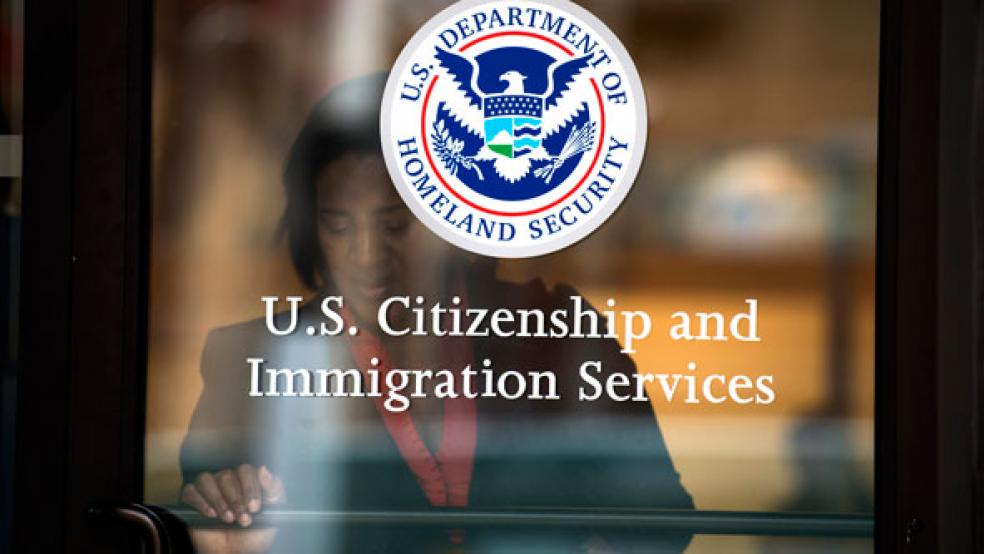The Senate gave a solid boost to a bipartisan immigration reform bill Monday evening after it was packed at the last minute with nearly $40 billion of border security measures designed to reel in conservative Republicans.
By a vote of 67 to 27, the Senate agreed to cut off debate and move towards final action on a measure crafted by a bipartisan “Gang of Eight” designed to alter the nation’s legal, economic and political landscape. Fifteen Republicans joined 50 Democrats and two independents to vote for cloture. A minimum of 60 votes was needed to prevent a filibuster, but Sen. Charles Schumer (D-NY) predicted over the weekend that the legislation would draw as many as 70 votes once the border security spending was added.
Schumer and other members of the “Gang of Eight” are counting on a big final vote to somehow persuade House Republicans to soften their opposition to major immigration reform. The Senate is likely to hold a final vote by Friday, ahead of the July 4th recess. It’s far from clear that the “Gang of Eight” can add to the vote by then.
RELATED: IMMIGRATION REFORM COSTS--$7 BILLION OR $2.6 BILLION?
The legislation, if approved, would pour unprecedented sums into tightening security along the 1,954 mile U.S.-Mexico border. It would also greatly expand the number of visas granted annually to attract both high-skill and low-skill temporary workers to this country. And it would create a complicated, decade-long path to permanent legal status or U.S. citizenship for the nearly 11 million illegal immigrants now in the country.
Congress last passed major immigration reform in 1986, when only an estimated three to five million illegal immigrants were living in the United States. That legislation sought to achieve many of the same goals as the pending legislation in the Senate.
Instead, the U.S. was swamped by illegal immigration from Mexico and Central American during one of the most difficult economic periods in U.S. history—a time when policy makers were looking for ways to reduce government education and social programs to curtail the deficit.
Democratic and Republican lawmakers are torn between approaches that would further crack down on illegal border crossings and root out undocumented workers or create a carrot and stick approach that would ultimately confer legal status on those willing to pay penalties and back taxes and move to the back of the line to apply for a “green card” or U.S. citizenship.
RELATED: BOEHNER’S PARADOX--A GOP TRAP ON IMMIGRATION REFORM
President Obama favors a major overhaul that would absorb illegal immigrants into the economy and society, although he has generally kept his distance from the debate in Congress.
On Capitol Hill, the battle over immigration reform has pitted a handful of pro-reform lawmakers– including Schumer, Democrat Richard Durbin of Illinois and Republicans John McCain of Arizona and Marco Rubio of Florida – against a formidable group of conservative Republicans led by Sens. Jeff Sessions of Alabama, Chuck Grassley of Iowa and Ted Cruz of Texas.
The turning point came late last week, when Sens. Bob Corker (R-TN) and John Hoeven (R-ND) hammered out a compromise to allay conservatives’ concerns that the bill didn’t do enough to tighten security along the U.S.-Mexican border. Their amendment would authorize a military-style “surge” in border security, aerial drone surveillance, and an additional 700 miles of fencing and radar. That would mean an additional 19,200 Border Patrol agents deployed.
The amendment also mandates an electronic visa entry/exit system at all air and seaports of entry where U.S. Customs and Border Protection officers are currently deployed. And it would help build an e-Verify system for use by all employers to determine whether job applicants are legally in this country.
The Congressional Budget Office on Monday estimated that the Corker-Hoeven amendment would cost $46.3 billion for expenses related to the security of the southern U.S. border and initial administrative costs. That’s a $38 billion increase in border security spending from the level approved by the Senate Judiciary Committee in late May.
RELATED: BORDER SECURITY—A BIG OBSTACLE TO IMMIGRATION REFORM
Under both the amendment and the committee-approved bill, CBO estimates that about $6 billion of the total will be offset by penalties and fees between 2014 and 2023 period.
Sen. John Cornyn, R-Texas, an avowed foe of the bill, declared he could not support the amendment without having a better idea of how much it would eventually cost and whether it makes sense to double the border patrol without knowing whether it is even the right strategy.”
Even liberal Democrats such as Senate Judiciary Committee Chairman Patrick Leahy (D-Vt.) argued that the huge boost in spending for border-security technology is a potential magnet for waste and fraud. Leahy complained that the Corker-Hoeven language “reads like a Christmas wish list for Halliburton.”
House Speaker John Boehner, R-Ohio, said last week he would refuse to bring any immigration reform bill to the floor this year that didn’t have the support of a majority of his members. That would pretty much preclude taking up a Senate “Gang of Eight” style bill unless there was a sea change in thinking among his members.




